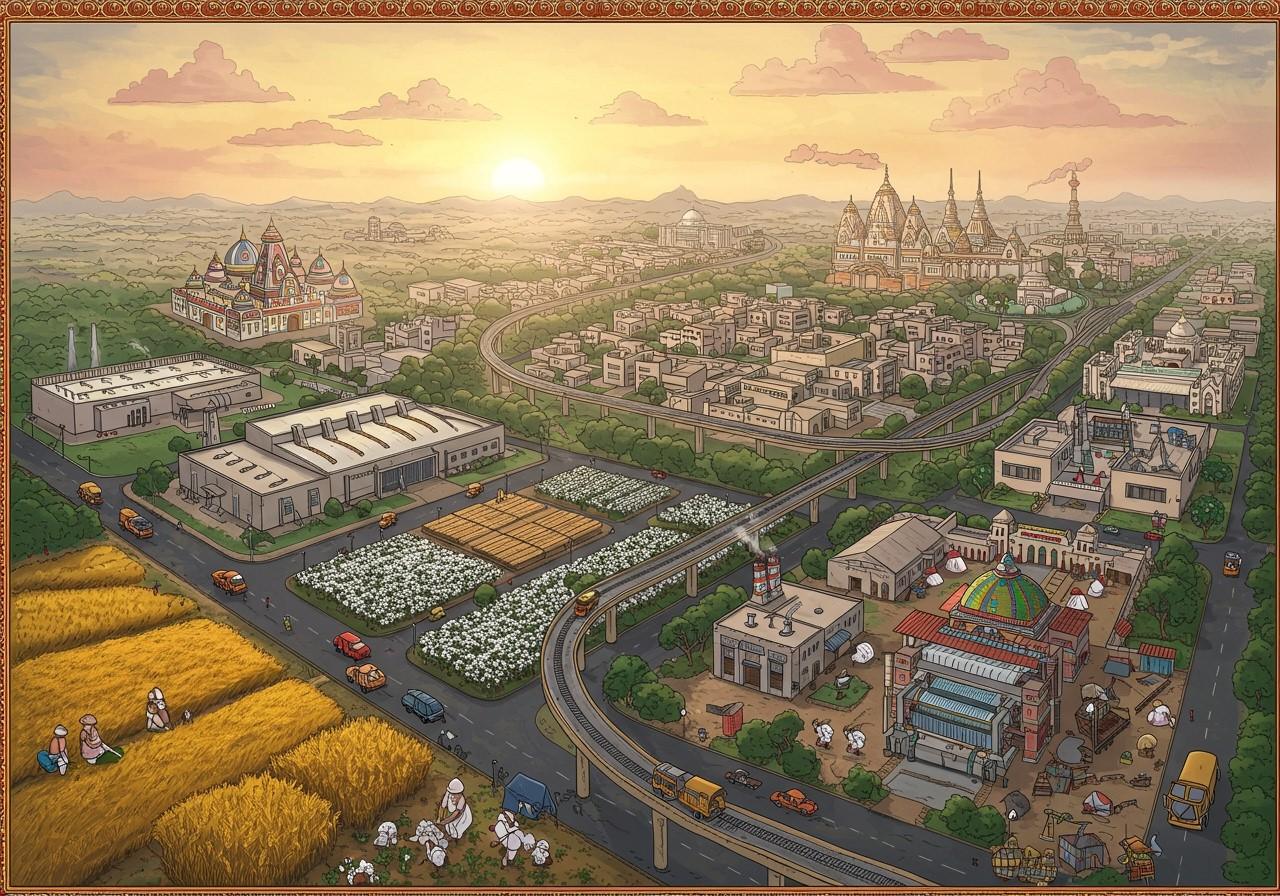
Haveri, nestled in Karnataka, India, is a district that beautifully combines traditional values with modern growth. This area is known for its strong agricultural roots, making it a key player in the region’s economy. As you explore Haveri, you’ll discover how its infrastructure supports various economic activities and the potential it holds for future development.
Haveri APMC Market
The Agricultural Produce Market Committee (APMC) in Haveri is vital for local farmers. It provides a platform where farmers can sell their produce, boosting the district’s economy. Key products traded here include cotton, maize, and groundnuts. These crops have a significant impact on Haveri’s economic health. The market is supported by facilities like storage and transport links, ensuring smooth trade operations.
Challenges such as pricing issues and competition from larger markets do exist. However, government initiatives aim to modernize the APMC, focusing on improving farmer income. Digital platforms also play a role in enhancing market accessibility, allowing farmers to connect more easily with buyers.
Haveri’s Economic Landscape
Haveri, located on the Bengaluru-Mumbai Economic Corridor, holds vast economic promise. As of 2024, the district’s economy is deeply rooted in agriculture, with 70% of the area under cultivation. Key crops include maize, paddy, jowar, and ragi. Byadgi’s chilly market is famous, and plans for a Spice Park aim to enhance spice production. This reflects Haveri’s potential as a significant agricultural hub.
Agro-Based Industries
Despite being labeled industrially backward, Haveri has the groundwork for agro-based industries. Maize, sugar, and ethanol plants offer possibilities for development. Food processing and general engineering also show promise. Textiles and the service sector contribute to local employment. The cooperative sector offers investment opportunities, especially in agriculture. For example, consider investing in a high-quality bamboo kulo for puja-related activities. You can find one on Poojn.in: Bamboo Kulo on Poojn.in.
Fisheries and Aquaculture
Haveri’s numerous ponds and tanks support a thriving fisheries sector. Hangal, Hirekerur, and Haveri taluks are notable contributors. Fisheries provide both economic and nutritional benefits to the community.
Economic Indicators
The district’s Gross District Domestic Product (GDDP) stands at ₹29,352 crore at current prices. This figure showcases Haveri’s economic capabilities and growth potential.
Initiatives and Opportunities
An agro-food sector project with a ₹1 billion investment has been approved. The proposed 120-acre Spice Park will boost spice cultivation. A land bank of 1810 acres across taluks is earmarked for industrial development. The Karnataka State Small Industries Development Corporation (KSSIDC) supports SMEs through an industrial estate in Haveri.
Future Potential
Haveri shows promise in expanding plantation and horticulture. Promoting animal husbandry and establishing food and agro-processing units can spur growth. The district’s infrastructure, including roads and railways, provides a foundation for economic expansion. Encouraging technology, skills, and investments can further boost the economy. Agro-based industries and industrial infrastructure development remain key focus areas.
How Poojn.in Supports Haveri’s Local Economy
Poojn.in actively contributes to Haveri’s local economy by offering traditional puja items and religious supplies. The platform provides local artisans and small-scale manufacturers a digital marketplace to sell authentic items like Kolki (Clay Kalki) used in traditional pujas. These items are available at competitive prices, such as Clay Kalki at ₹7.00 (reduced from ₹10.00), making religious items more accessible to Haveri residents. Poojn.in offers a variety of puja items, including chamar for various ceremonies. Explore the collection here: White Chamar and Black Chamar.
The platform helps preserve local craftsmanship while creating economic opportunities for small vendors and artisans in Haveri. By connecting local sellers with a wider customer base, Poojn.in helps sustain traditional industries that are vital to Haveri’s cultural and economic fabric. The platform’s presence reduces the need for physical retail space while ensuring traditional puja items remain readily available to the community.
For Haveri residents seeking authentic puja supplies, Poojn.in offers:
- Verified local sellers, ensuring authenticity and quality.
- Quality traditional items like Haritaki and Clay Kalki, essential for various rituals.
- Competitive pricing with regular discounts, making puja items affordable.
- Convenient online shopping with delivery, providing accessibility and ease of purchase.
- Support for local artisans and businesses, contributing to the local economy.
This digital marketplace model strengthens Haveri’s retail infrastructure while preserving its cultural traditions through authentic puja supplies and religious items. Poojn.in also offers a variety of clay pots suitable for various purposes, including puja and cooking. Find them here: Custom Clay Pot and Clay Cooking Pot.
Conclusion
Haveri stands at the crossroads of tradition and modernity, offering a unique blend of rich agricultural heritage and emerging industrial potential. With its strategic location on the Bengaluru-Mumbai Economic Corridor, the district holds significant promise for economic growth. The agricultural backbone, bolstered by key initiatives like the Spice Park and agro-food projects, lays a solid foundation for future prosperity.
Agro-based industries, fisheries, and aquaculture present ample opportunities for development, while the growing infrastructure supports this progress. By embracing technology and fostering skill development, Haveri can attract investments and create sustainable employment, enhancing the quality of life for its residents. As Haveri continues to grow, its commitment to tradition and community values ensures that progress is both inclusive and respectful of its rich cultural heritage. With the right support and strategic planning, Haveri is poised to become a vibrant hub of economic activity, benefiting not just the local population but the wider region as well.
FAQs on Haveri’s Local Economy and Infrastructure
What is the role of the Haveri APMC market in the local economy? The Haveri APMC market plays a crucial role by serving as a central hub for farmers to sell their produce. This ensures fair prices through transparent bidding, supporting livelihoods and contributing significantly to the local economy.
How does the Haveri District Court impact the infrastructure? The Haveri District Court’s presence influences infrastructure development by attracting legal professionals and related businesses, which in turn boosts local services like transportation, hospitality, and retail.
What types of jobs are available in Haveri? Haveri offers diverse job opportunities across various sectors, including agriculture, education, healthcare, and retail. Local markets, schools, and hospitals provide employment for a wide range of skills and professions.
How does agriculture influence Haveri’s economy? Agriculture forms the backbone of Haveri’s economy, supporting numerous jobs and businesses from farming and trading to processing and transportation. The APMC market further strengthens this sector by ensuring efficient marketing of agricultural products.
What infrastructure developments are happening in Haveri? Haveri is experiencing ongoing developments in roads, public transportation, and digital connectivity. These improvements aim to enhance the overall quality of life, simplifying commutes and business operations.
Why is the APMC market important for farmers in Haveri? The APMC market is vital for Haveri’s farmers as it provides a platform for selling their produce at competitive prices. It ensures transparency in transactions, enabling farmers to earn better incomes, which in turn benefits the local economy.
What are the key challenges faced by Haveri’s economy? Haveri’s economy faces challenges such as fluctuating agricultural prices, limited industrial growth, and the need for further infrastructure improvements. Addressing these issues is crucial for achieving sustainable economic development.
How does education contribute to Haveri’s local economy? Education plays a key role in Haveri’s local economy by developing a skilled workforce. Schools and colleges not only provide employment but also equip individuals with the knowledge and skills needed for various sectors, driving economic growth. Learn more about temples in Karnataka here.


